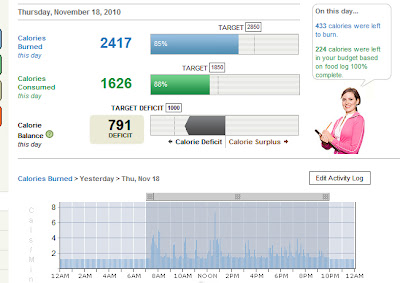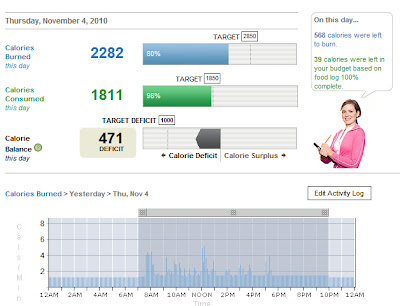My name is Katie J and I have a shopping addiction. I have joked about this in the past but it really is not a laughing matter. I think there is also a correlation between addictions. I have had other addictions in the past and have been able to control/overcome them so I think that by me admitting my shopping addiction, it is the first step in recovering. I have been in debt twice and successfully paid it off. The 1st time it was about $12K and the second time was about $5K. It took me awhile
forever to pay them off but I did pay them off by going through a debt management company. I haven't had to declare bankruptcy but I definitely should have more savings then I do. I currently do not have any credit cards so there is no temptation there. I have a workbook that I received through the debt management company that teaches you about your spending habits and how to establish a budget etc. so I am going to make it my goal to complete it over the 4 day weekend next week.
I came across this article at
WebMd and thought it was very interesting. It was written by
Heather Hatfield
From hitting the mall with your girlfriends on a Saturday afternoon, to holiday spending on gifts that go under the tree, shopping could be called one of America's favorite pastimes.
For most people, it means some new clothes for work or a small trinket for a friend. For others, however, shopping is much more than an enjoyable pastime, and in some cases, it is a real and destructive addiction that can turn into a financial disaster.
"Compulsive shopping and spending are defined as inappropriate, excessive, and out of control," says Donald Black, MD, professor of psychiatry at the University of Iowa College of Medicine. "Like other addictions, it basically has to do with impulsiveness and lack of control over one's impulses. In America, shopping is embedded in our culture; so often, the impulsiveness comes out as excessive shopping."
Sometimes referred to as "shopoholism," shopping addiction can wreak havoc on a person's life, family, and finances. Experts explain to WebMD why shopping can be so addictive, what the warning signs are, and how to stop the cycle of spending.
Reinforced Shopping
"No one knows what causes addictive behaviors, like shopping, alcoholism, drug abuse, and gambling," says Ruth Engs, EdD, a professor of applied health science at Indiana University. "Some of the new evidence suggests that some people, maybe 10%-15%, may have a genetic predisposition to an addictive behavior, coupled with an environment in which the particular behavior is triggered, but no one really knows why."
While the origin of addictions remains uncertain, why addicts continue their destructive behaviors is better understood.
"Individuals will get some kind of high from an addictive behavior like shopping," says Engs. "Meaning that endorphins and dopamine, naturally occurring opiate receptor sites in the brain, get switched on, and the person feels good, and if it feels good they are more likely to do it -- it's reinforced."
So what are the telltale signs that shopping has crossed the line and become an addiction?
Shopoholism
"There are certainly a lot of commonalities among shopoholics and other addicts," says Engs. "For instance, while alcoholics will hide their bottles, shopoholics will hide their purchases." What else should a concerned family member or friend look out for when they think shopping has become a problem?
Spending over budget. "Often times a person will spend over their budget and get into deep financial trouble, spending well above their income," says Engs. "The normal person will say, 'Oops, I can't afford to buy this or that.' But not someone who has an addiction," explains Engs -- he or she will not recognize the boundaries of a budget.
Compulsive buying. "When a person with a shopping addiction goes shopping, they often compulsively buy, meaning they go for one pair of shoes and come out with 10."
It's a chronic problem. "A shopping addiction is a continuous problem," says Engs. "It's more than two or three months of the year, and more than a once-a-year Christmas spree."
Hiding the problem. "Shopoholics will hide their purchases because they don't want their significant other to know they bought it because they'll be criticized," says Engs. "They may have secret credit card accounts, too. Because this problem affects mostly women, as alcoholism affects mostly men, husbands will all of sudden be told their wife is $20,000-$30,000 in debt and they are responsible, and many times, this comes out in divorce."
A vicious circle. "Some people will take their purchases back because they feel guilty," says Engs. "That guilt can trigger another shopping spree, so it's a vicious circle." And in these people, debt may not be an issue because they're consistently returning clothes out of guilt -- but a problem still exists.
Impaired relationships. "It is not uncommon for us to see impairments in relationships from excessive spending or shopping," says Rick Zehr, vice president of addiction and behavioral services at Proctor Hospital at the Illinois Institute for Addiction Recovery. "Impairment can occur because the person spends time away from home to shop, covers up debt with deception, and emotionally and physically starts to isolate themselves from others as they become preoccupied with their behavior."
Clear consequences. "It's just like any other addiction -- it has nothing to do with how much a person shops or spends, and everything to do with consequences," says Zehr. "We often get the question around the holidays that because a person spent more money than she intended, does this make her an addict? The answer is no. However, if there is a pattern or a trend or consequences that occur with excessive shopping then the person may be a problem spender -- the hallmark is still loss of control. If they are no longer in control of their shopping but their shopping is in control of them, they've crossed the line."
According to Zehr, these behaviors can also signal a serious problem:
- Shopping or spending money as a result of feeling angry, depressed, anxious, or lonely
- Having arguments with others about one's shopping habits
- Feeling lost without credit cards -- actually going into withdrawal without them
- Buying items on credit, rather than with cash
- Describing a rush or a feeling of euphoria with spending
- Feeling guilty, ashamed, or embarrassed after a spending spree
- Lying about how much money was spent. For instance, owning up to buying something, but lying about how much it actually cost
- Thinking obsessively about money
- Spending a lot of time juggling accounts or bills to accommodate spending
"If someone identifies four or more of any of these behaviors, there may be a problem," Zehr explains to WebMD.
Seeking Addiction Help
When a friend or family member recognizes a shopping addiction, start by getting professional help.
"The first thing to do is to seek help, and that can occur at different levels," says Zehr. "For the spouse, family member, or friend who is concerned, an intervention is always a good idea. Also, find the closest Debtors Anonymous, which is a 12-step program that will be important for ongoing maintenance and support. And get credit counseling, as many of the people who seek treatment at our facility have an average debt as a result of their addiction of around $70,000." <--- yikes!!!
Recognize, as well, that treating a shopping addiction requires a multifaceted approach.
"There are no standard treatments for shopping addiction," says Black. "Medications have been used, generally antidepressants that treat, in some cases, the underlying issue of depression in someone with an addiction, but with mixed results. Therapists also focus on cognitive-behavioral treatment programs, and credit or debt counseling can be very helpful to some people, as well."
Black explains that there is no quick and easy answer that will immediately cure a shopping addiction, and while treatment is a necessary part of solving the problem, so is behavior change on the part of the addict.
"With some patients, I tell them they should have a self-proposed ban on shopping, and with others, some of my very worst cases, I tell them they should have someone else controlling their finances for them," says Black.
Black recommends some basic changes in behavior that will have a big impact on breaking a shopping addiction:
- Admit that you are a compulsive spender, which is half the battle
- Get rid of checkbooks and credit cards, which fuel the problem
- Don't shop by yourself because most compulsive shoppers shop alone and if you are with someone you are much less likely to be spend
- Find other meaningful ways to spend time
And keep in mind that while behavior change is clearly crucial to recovery, so is reaching out for help.
"While I recommend starting with a psychiatric evaluation, you can also find out what resources are in your area, and where you, a relative, or friend can start to get help," says Engs.























